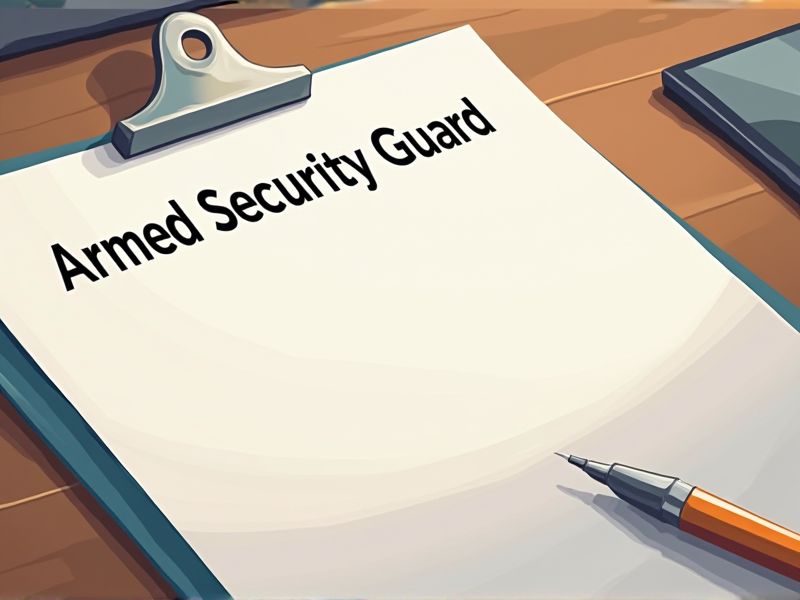
Armed security guards carry significant responsibility in safeguarding property and individuals, making specific certifications crucial. These certifications ensure guards possess the necessary skills to handle firearms safely and respond effectively in high-pressure situations. Training courses cover legal compliance, de-escalation techniques, and emergency response strategies. Here are some important certifications you may need when pursuing a career as an armed security guard.
Armed Security Guard License
An armed security guard license is mandated due to heightened responsibilities that entail carrying a firearm, as it ensures proficiency and accountability. Licensing requires background checks, reducing the risk of firearms misuse in public security spaces. Training and certification processes validate the guard's knowledge and capability to appropriately handle critical situations. Regulatory bodies aim to maintain public trust and safety through such licenses, reinforcing that those entrusted with firearms have the necessary expertise.
Firearms Proficiency Certification
Firearms proficiency certification ensures that armed security guards possess the necessary skills to handle weapons safely, reducing the risk of accidental discharge. Certification verifies that guards can accurately assess and respond to situations requiring force, enhancing the overall security of the facility or individual they protect. Proficiency training often includes legal and ethical guidance on firearms use, reinforcing accountability and minimizing liability for employers. Regular certification updates guarantee that guards remain aware of evolving laws and technologies, maintaining a high standard of competence in their field.
Use of Force Certification
The Use of Force Certification ensures that armed security guards are trained to appropriately assess and handle situations that require physical intervention, minimizing harm to themselves and others. Misjudgments in use of force can lead to severe legal and financial consequences for both the guards and their employers. Certification establishes a standard of competence and accountability, instilling public trust in the professionalism and safety of the security services provided. It also equips security personnel with a clear understanding of legal and ethical boundaries, promoting adherence to laws governing armed security operations.
Defensive Tactics Certification
Possessing a Defensive Tactics Certification equips an armed security guard with the necessary skills to handle confrontational situations safely, reducing the risk of harm to both the guard and others involved. Certification provides standardized training, ensuring that a security guard meets industry benchmarks and adheres to best practices in law enforcement. In high-stakes environments, trained defensive tactics can de-escalate potential threats effectively, thereby enhancing overall security. The certification also enhances the guard's credibility and employability, as employers seek professionals capable of managing challenging scenarios proficiently.
CPR and First Aid Certification
CPR and First Aid certification enhances an armed security guard's ability to respond effectively to medical emergencies, ensuring immediate care until professional medical help arrives, potentially saving lives. This knowledge can reduce the severity of injuries, minimizing medical costs and recovery time for individuals involved. Possessing these skills can foster a safer environment, which is crucial in high-risk areas requiring armed security. Employers might require or prefer certified guards as it indicates preparedness and responsibility, contributing to overall operational effectiveness and public safety.
Emergency Response Certification
Emergency Response Certification equips armed security guards with essential skills to manage crises efficiently, enhancing safety in critical situations. This certification ensures guards are trained to de-escalate potentially volatile situations, reducing harm to individuals and property. Legal and regulatory compliance requires security personnel to meet specific standards, and certification acts as a testament to this commitment. Guards with such training often demonstrate higher levels of confidence and situational awareness, leading to better decision-making during emergencies.
Active Shooter Response Certification
Active Shooter Response Certification equips armed security guards with the necessary skills to effectively respond to life-threatening situations, mitigating potential harm. Proper training enhances decision-making abilities under pressure, ensuring a coordinated and strategic reaction. Certifying these guards builds trust with clients and employers, demonstrating a commitment to safety and preparedness. Guard competence increases when they understand law enforcement protocols, fostering collaboration during emergencies.
Crisis Intervention Training Certification
Crisis Intervention Training Certification equips armed security guards with essential de-escalation techniques, reducing the likelihood of forceful resolutions. Properly trained guards are more adept at recognizing mental health crises, ensuring appropriate responses that protect all parties involved. Training increases guards' confidence in handling complex situations, which enhances their overall effectiveness and safety in the field. Security agencies benefit from reduced liability and improved public trust when their personnel are certified in crisis intervention skills.
Protective Surveillance Certification
Protective Surveillance Certification is crucial because it provides guards with essential skills to effectively monitor and assess potential threats in real-time. The certification ensures that armed security personnel are trained to de-escalate situations, which reduces the likelihood of violent confrontations. It also aligns with legal and industry standards, thereby lowering liability risks for security firms. Certification enhances the guards' credibility and professionalism, making them more reliable in safeguarding people and assets.
Conflict Resolution Certification
Possessing a conflict resolution certification equips armed security guards with skills to de-escalate tense situations, reducing the need for physical force. This training directly contributes to creating a safer environment for both the guards and those they protect. Employers of security personnel who hold such certifications show a commitment to a responsible and ethical approach to security. Research indicates that effective conflict resolution leads to better outcomes, decreasing potential for incidents that could result in legal liabilities.
Summary
When you obtain certifications as an Armed Security Guard, your credibility and professional reputation can increase significantly. Employers often prioritize certified guards, which could lead to better job opportunities and higher pay. Your enhanced skills may also improve your on-the-job decision-making and safety awareness. Certification demonstrates commitment to the field, likely leading to career advancement.
